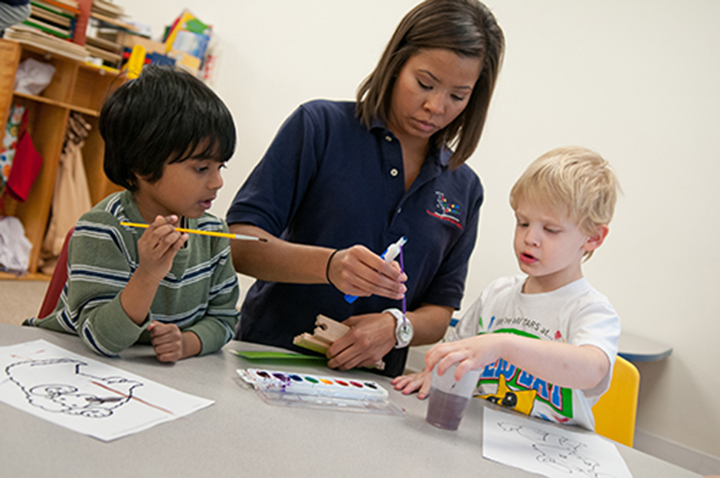Despite a growing number of individuals being diagnosed with Autism Spectrum Disorders (ASD), there are few resources for treatment. Karla Doepke, associate professor of psychology, has consequently made it her mission to treat children with ASD and train students to work with those affected by the disease.
The Centers for Disease Control and Prevention estimates that one in 88 children has some form of ASD. Few have the expertise and experience to treat the social, communication, and behavioral challenges caused by ASDs, and as a result many go untreated.
“Treatment is intensive,” Doepke said. “One of the difficulties with being able to provide treatment is that it takes a lot of resources. Until recently, few services were reimbursable by insurance. The structure of the state also does not make it beneficial for practitioners to provide services.”
Doepke is painfully aware of the treatment dilemmas that families face. She recalls a mother of an autistic child who was directed to Doepke while searching for someone to treat her son. Knowing how time consuming autism treatment is, Doepke was reluctant to take on the task without the necessary resources. Yet the mother insisted, and after numerous pleas, Doepke agreed to begin treating the child. Within a few weeks she was treating two other children. And the number continued to grow.
The need was so great that in 2001, Doepke directed the establishment of The Autism Place (TAP) at Illinois State University. Though initially staffed only by Doepke and three students, a grant received in 2004 from The Autism Program allowed Doepke to hire two graduate students to assist with treatment. In time more grants and a growing need justified a move to a larger facility with a larger staff.
Today Doepke and a regular team of eight graduate clinicians, 10 graduate students, 15 psychology students, and 30 undergraduate clinicians serve 85 children and families each week.
“It makes a lot of sense to offer treatment at a university because there are a lot of educational benefits of working with kids with autism,” Doepke said. “Students studying psychology, special education, nursing, and speech and language pathology all receive an educational benefit from working with the children. And it provides a major benefit to the community.”
Children at TAP are evaluated for levels of communication, socialization, and independent functioning. A program is developed to take them from where they are to the next level. That next level can vary greatly from individual to individual. Treatment can take place at the clinic or at the child’s home, based on family needs, making it necessary for clinicians to adapt to each child.
“Students are excited at the beginning, but very quickly feel inadequate,” Doepke said. “They quickly gain the skills to work with the children and then they love it. It is a whole new experience for most.”
Sandy Clark agrees. A fourth year graduate student, she first experienced working with autistic children at TAP.
“It has been a good experience,” Clark said. “But in the beginning it was baptism by fire.”
Now with four years of experience at TAP, Clark has come to love working with the children. The job has transitioned from one of stress to fun.
TAP Graduate Clinician Coordinator Tom Mulderink also loves the work he does. He has been charged with administrative tasks such as scheduling, training graduate clinicians, intakes and assignments, and consultation outside of the clinic in homes and schools.
“Being able to train people and send them out to use that knowledge creates a wider reach,” Mulderink said. He also relishes the opportunity to play with the children, bonding over action figures and shared interests such as Star Wars.
But the work isn’t always easy.
“One of the more difficult things is helping parents deal with Autism,” Mulderink said. “It requires a lot of empathy because I don’t have the same experience. We work with the children for a few hours a week, but the parents are with them all of the time.”
Families consequently have a great appreciation for the help they received through TAP. As a training site for students, families are not charged for treatment sessions. Receiving a service not widely available eases a burden on families. TAP coordinates with schools and other agencies, such as Easter Seals and Catholic Charities, to make sure the services offered complement rather than duplicate or compete.
Knowing the value of TAP, parents and families now work to provide financial support through Friends of TAP. The group raised funds so that even if grants and private funds that keep TAP open became unavailable, services can continue. Their work funded summer 2012 sessions and continues to enhance TAP.
The support of groups such as Friends of TAP and partnerships with other organizations in the community ensures that Doepke and her team can focus on what matters most—the children.
“Children with autism will surprise you,” Doepke said. “They can make great progress. As much as we help them learn, they help us learn. I don’t think there is a day that goes by that we don’t learn something from them. I was reluctant to dive into autism service because it is so intensive. But it is the most fun thing I get to do. It makes my job at ISU exactly the way I would want it to be.”


One thought on “The Autism Place: An Invaluable Service”